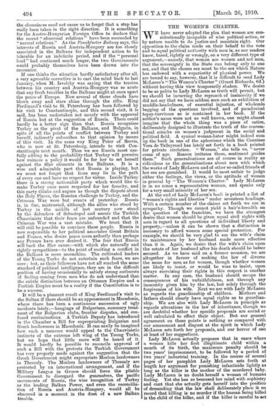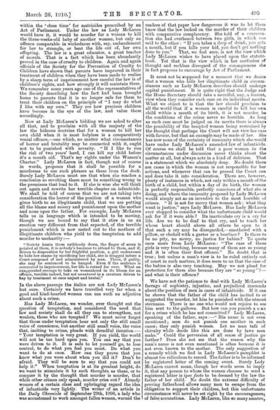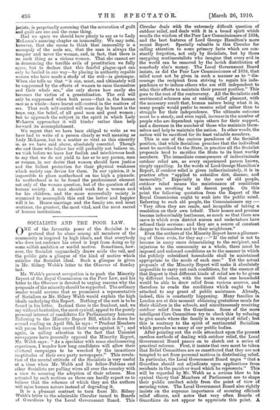THE WOMEN'S CHARTER.
WE have never adopted the plea that women are con- stitutionally incapable of wise political action, or by nature unable to do justice and maintain right. Our opposition to the claim made on their behalf to the vote and to equal political authority with men is, as our readers know, based, rightly or wrongly, on a very different type of argument, —namely, that women are women and not men, that the sovereignty in the State can belong only to one sex, and that the chosen sex must be the sex which Nature has endowed with a superiority of physical power. We are bound to say, however, that it is difficult to read Lady McLaren's " The Women's Charter" (Grant Richards, 6d.) without having this view temporarily shaken. We desire to be as polite to Lady McLaren as truth will permit, but we should be incurring the reproach of insincerity if we did not say that we have seldom seen such an exhibition of muddle-headedness, of essential injustice, of wholesale begging of the questions involved, and of paradoxical topsy-turviness as is contained in her book. If the author's name were not so well known, one might almost imagine that the whole thing was a piece of satire, deliberately designed to illustrate the truth of the conven- tional attacks on women's judgment in the social and political field. A cynical woman-hater might indeed sum up the book in one of the aphorisms which the Countess Vera de Talleyrand has lately set forth in a book printed for private circlation. "Women," she tells us, "never come of age. Reason irritates them, sentiment guides them." Such generalisations are of course in reality as ridiculous as the generalisations about men with which the works of Lady McLaren and of other so-called friends of her sex are garnished. It would be most unfair to judge either the feelings, the views, or the aptitude of women in general by "The Women's Charter.' Lady McLaren is in no sense a representative woman, and speaks only for &very small minority of her sex. At the end of Lady McLaren's book is printed a list of "women's rights and liberties" under seventeen headings. With a certain number of the claims set forth we are in sympathy. Though we cannot yield a hair's-breadth on the question of the franchise, we have the strongest desire that women should be given equal civil rights with men in regard to all questions of individual liberty and property,—unless it can be shown that a distinction is necessary to afford women some special protection. For example, we should be very glad to see the wife's claim to maintenance by her husband made more effective than it is. Again, we desire that the wife's claim upon the estate of her husband after his death should be better secured. As we have said on a former occasion, we are altogether in favour of making the law of divorce the same for men as for women, though whether women are likely to insist, or would be wise to insist, upon always exercising their rights in this respect is another matter. In any case, the husband should escape the consequences of his unfaithfulness, not through any immunity given him by the law, but solely through the forgiveness of his wife. Next we are with Lady McLaren as regards the guardianship of children. Mothers and fathers should clearly have equal rights as to guardian- ship. We are also with Lady McLaren in principle as regards alterations in the law of inheritance, though we are doubtful whether her specific proposals are sound or well calculated to effect their object. But our general agreement on these points is nothing as compared with our amazement and disgust at the spirit in which Lady McLaren sets forth her proposals, and our horror of one at least of her suggestions. Lady McLaren actually proposes that in eases where a woman kills her first illegitimate child within a month of its birth, the maximum penalty should be two years' imprisonment, to be followed by a period of two years' industrial training. In the course of several pages of her pamphlet Lady McLaren sets forth at length her argument for punishing infanticide lightly as long as the killer is the mother of the murdered baby. Lady McLaren is no doubt herself a woman of humane feeling. Yet she has so bemused her mind with sophistry and cant that she actually gets herself into the position of demanding that the law shall deliberately place it on record that killing is no murder if the human being killed is the child of the killer, and if the killer is careful to act within the 'close time' for matricides prescribed by an Act of Parliament. Under the law as Lady McLaren would have it, it would be murder for a 'woman to kill the three-weeks-old baby of another woman, but only an offence comparable in wickedness with, say, embezzlement for her to strangle, or beat the life out of, her own offspring. The law is a great educator, a great teacher of morals. That is a fact which has been abundantly proved in the case of cruelty to children. Again and again officials of the Society for the Prevention of Cruelty to Children have shown that parents have improved in their treatment of children when they have been made to realise by a sharp term of imprisonment how careful the law is of children's rights, and how strongly it will maintain them. We remember some years ago one of the representatives of the Society describing how the fact had been brought home to parents that it is no longer safe for them to treat their children on the principle of "I may do what I like with my own." They see how precious children have become in the eye of the law, and value them accordingly.
• Now at Lady McLaren's bidding we are asked to alter all that, and to proclaim with all the majesty of the law the hideous doctrine that for a woman to kill her own child when it is most helpless is a comparatively venial offence,—one which, no matter what circumstances of horror and brutality may be connected with it, ought not to be punished with severity. "If I like to run the risk of two years' hard, I can kill my child before it's a month old. That's my rights under the Women's Charter." Lady McLaren in fact, though not of course in words, proposes that it shall be possible for a murderess to use such phrases as these from the dock. Surely Lady McLaren must see that when she reaches a conclusion so revolting there must be something wrong in the premisses that lead to it. If she is wise she will think out again and rewrite her terrible chapter on infanticide. We shall be told of course that we are not taking into consideration the horror of the position of a woman who gives birth to an illegitimate child, that we are putting all the blame and misery and punishment upon the mother and none upon the father. For example, Lady McLaren tells us in language which is intended to be moving, though we are bound to say that it stirs in us an emotion very different from that expected, of the terrible punishment which is now meted out to the mothers of illegitimate children who yield to the temptation to add murder to unchastity :— "Society hunts them ruthlessly down, the finger of scorn is pointed at them, it is nobody's business to attend to them, and if, driven to desperation by her frightful position, a girl endeavours to hide her shame by sacrificing her child, she is dragged before a Court composed of and administered by men. There, if guilty, she may be sentenced to be hanged. Even if the sentence is commuted to imprisonment, her life is ruined for ever. What an exaggerated revenge to take on womanhood in its bloom for an offence, terrible indeed, but not unnatural in a creature driven to bay by treatment at once unjust and brutal."
In the above passage the italics are not Lady McLaren's but ours. Certainly we have travelled very far when a good and kind-hearted woman can use such an adjective about such a crime.
Has Lady McLaren, we wonder, ever thought out the question of temptation, and considered the need that law and society shall do all they can to strengthen, not weaken, those who are tempted? We must never forget that those under temptation hear not only the still small voice of conscience, but another still small voice, the voice that, inciting to crime, pleads with dreadful iteration :— " Your temptation is very great. If you yield, the world will not be too hard upon you. You can say that you were driven to it. It is safe to let yourself go, to lose control, to do what you feel you must. Do what you want to do at once. How can they prove that you knew what you were about when you did it ? Don't be afraid. They will be sure to say that you could not help it." When temptation is at its greatest height, do we want to stimulate it by such thoughts as these, or to conquer it by the thought that murder is murder, that while other crimes only speak, murder cries out ? Already women of a certain class and upbringing regard the idea of infanticide very lightly. The writer of an article in the Daily Chronicle of September 29th, 1908, a lady who was accustomed to work amongst fallen women, warned the' readers of that paper how dangerous it was to let them know that the law looked on the murder of their children with comparative complacency. She told of a conversa- tion she had overheard between two girls, in which one said to the other : "If you takes a drop of drink, you gets a month, but if you kills your kid, you don't got nothing done to you." That, we feel sure, is not the view which Lady McLaren wishes to have placed upon the statute- book. Yet that is the view which in her confusion of thought and reckless disregard of the consequences she in fact proposes to encourage by Act of Parliament.
It must not be supposed for a moment that we desire that a woman who kills her illegitimate child in circum- stances such as Lady McLaren describes should undergo capital punishment. It is quite right that the Judge and the Home Secretary should take a merciful, nay, a lenient, view when they consider each case on its individual merits. What we object to is that the law should proclaim to all the world that if a woman is careful to kill her own child within a month of its birth, it is not murder, be the conditions of the crime never so horrible. As long as each case must be judged on its merits there is always the possibility of the tempted woman being restrained by the thought that perhaps the Court will not view her case with favour, but that an example may be made of her. She has now none of the certainty of immunity which she would have under Lady McLaren's amended law of infanticide. Of course we shall be told that a poor woman in the circumstances under discussion never thinks about the matter at all, but always acts in a kind of delirium. That is a statement which we absolutely deny. No doubt there are cases in which the woman is not responsible for her actions, and whenever that can be proved the Court can and does take it into consideration. There are, however, plenty of instances in which, not only within a month of the birth of a child, but within a day of its birth, the woman is perfectly responsible, perfectly conscious of what she is doing, and where the immunity proposed bj Lady McLaren would simply act as an incentive to the most horrible of crimes. "it is not for mercy that women ask ; what they want is justice," says Lady McLaren. Has Lady McLaren ever stopped to consider what the unfortunate child would ask for if it were able ? Its inarticulate cry is a cry for life. Are we to be deaf to that cry, and to teach her whose heart should above all others be open to it that such a cry may be disregarded,—smothered with a pillow, or choked with a garter or a bootlace ? Is there to be no pity, no mercy, no justice for babies ? To quote once more from Lady McLaren : "The case of these girls is very touching, because many of them are so young and it is often their first offence." No doubt that is true ; but unless a man's view is to be ruled entirely out of court in such matters, it does seem to us that the case of the babies is also very touching. May we not plead for protection for them also because they are "so young " ?— and what is their offence?
We have not the patience to deal with Lady McLaren's farrago of sophistry, injustice, and prejudiced innuendo about the position of men in cases of infanticide. If it can be shown that the father of the child has incited to or suggested the murder, let him be punished with the utmost sternness. There is no one who would not rejoice to see him sent to the gallows. But bow can you punish a Iran for a crime which he has not committed ? Lady McLaren, speaking of the father, says :—" His name is not even mentioned ; men do not punish one another in such cases ; they only punish women. Let no man talk of chivalry while deeds like this are done by laws men make.' Could the perversion of all sense of justice go farther ? Does she not see that the reason why the man's name is not even mentioned is often because it is not even blown to the mother. The only suggestion of a remedy which we find in Lady McLaren's pamphlet is almost too ridiculous to record. The father is to be informed by registered letter of the coming event. Surely Lady McLaren cannot mean, though her words seem to imply it, that any person to whom the woman chooses to send a registered letter is ipso facto to be deemed by the law the father of her child. No doubt the extreme difficulty of proving fatherhood allows many men to escape from the obligation to support their children, but this unfortunate circumstance will never be set right by the encouragement of false accusations. Lady McLaren, like so many amateur *ids, is perpetually assuming that the accusation of guilt and guilt are one and the same thing. Had we space we should have plenty to say as to Lady McLaren's amazing chapter on immorality. We may note, however, that she seems to think that immorality is a monopoly of the male sex, that the man is always the tempter and never the woman, and, in fact, that there is no such thing as a vicious woman. That she cannot err in denouncing the terrible evils of prostitution we fully agree, but to declare that this fearful plague-spot can only be healed in one way—by placing in authority capable women who have made a study of the evil—is grotesque. When she tells us that "it can, must, and ultimately will be suppressed by the efforts of women to raise themselves and their whole sex," she only shows how easily she becomes the victim of a generalisation. The evil will only be suppressed when both sexes—that is, the human race as a whole—have learnt self-control in. the matters of sex. That such self-control will some day be learnt is the hope, nay, the belief, of all good men and good women ; but to approach the subject in the spirit in which Lady McLaren approaches it will hinder rather than help forward its accomplishment.
We regret that we have been obliged to write as we have had to write of a person clearly so well meaning as Lady McLaren, but in a matter so vital as this sincerity is, as we have said above, absolutely essential. Though she anel those who follow her will probably not believe us, we wish before we leave her foolish and mischievous book to say that we do not yield to her or to any person, man or woman, in our desire that women should have justice and the fullest protection for their physical weakness which society can devise for them. In our opinion, it is. impossible to place motherhood on too high a pinnacle In motherhood is to be found the predominant element not only of the woman question, but of the question of all human society. A man should work for a woman and for his children, and the more successfully society is organised to accomplish this end the better and happier will it be. Hence marriage and the family are, and must continue, the greatest, the most vital, and the most sacred of human institutions.








































 Previous page
Previous page